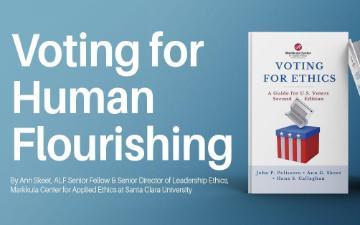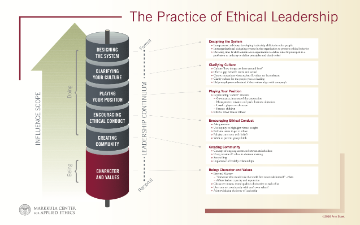
Ann Skeet (@leaderethics) is the senior director of leadership ethics, an ALF Senior Fellow from Class X, and served as ALF's CEO from 2000-2008. She is a co-author of Voting for Ethics: A Guide for U.S. Voters Second Edition and Ethics in the Age of Disruptive Technologies: An Operational Roadmap. Views are her own.
This article first appeared on the American Leadership Forum - Silicon Valley Blog and is republished with permission.
To many, the upcoming election is seen as the most consequential in our lifetime, in part because the political divisions across the country are so deep. Not only are there differences of opinion on policy matters, but people in both parties have begun to identify those in the other party as bad people, not just people with different points of view. Increasingly, people’s identities are wrapped up with their politics, reinforcing the sense that we are part of tribes that cannot find common ground.
Ethics can be that common ground.
When you mention ethics, many people tend to think first of being judged, of whether or not they did something wrong. Aristotle saw ethics as central to our ability to live the “good life.” He defined eduaimonia, a Greek word that translates roughly to happiness, as the highest human good achieved, one reached by living a life according to ethics and virtue. This gives us a different way to think about ethics as not just a way to decide right and wrong, but as a condition of human flourishing.
This winter, I had the privilege of working on a second edition of a book first written by a former colleague at the Markkula Center for Applied Ethics, Hana Callaghan, who has since passed away. The book, Voting for Ethics: A Guide for U.S. Voters, lays out in intentionally simple terms what voters should look for in candidates and campaigns in U.S. elections to support ethical politics.
One of the other privileges I have had, in addition to being a Fellow in ALF’s Class X, was to serve as ALF’s (Silicon Valley) CEO for Classes XII-XX. I can well remember a discussion around the ALF campfire in the early aughts, shortly after the passage of Sarbanes-Oxley legislation that, amongst other things, put CEOs on the hook for the actions and behavior of their employees. One Fellow serving as a CEO at the time asked during a discussion about the law, “What can I do to make sure everyone in my company does the right thing?” What indeed?
That question has informed my scholarship during my ten years at the Markkula Center for Applied Ethics at Santa Clara University, where I study leadership ethics. It shaped the research I have done in organizations to identify conditions that make it more likely for ethics to be used. And it formed the foundation of a practice of ethical leadership I developed for the center drawing very much from observations I made of leaders participating in ten different ALF classes, each of whom was the “best class,” by the way. Except the class that was the “baddest.” Or the one that was the “best-looking.” But I digress.
What the model of ethical leadership we work with at the Markkula Center reinforces is that effective, ethical leadership requires a balance between both the being and the doing of leadership, a concept I was first introduced to at ALF. By the being and the doing, I mean both the character of the leader (the being) and the actions they take (the doing).

The graphic I use to convey this practice of ethical leadership is a vertical column (Fig. 1), with character at its base and each action stacked on top of each other. It’s drawn that way to convey that if you remove the character-building block, the leader’s impact is lessened. In other words, character is the foundation of how we accomplish things as leaders.
And that concept is at the heart of “Voting for Ethics.” In it, I apply this practice of ethical leadership to candidates for public office. (We also talk about other things, like the use of AI in elections.) The book helps individuals become informed voters who can identify candidates who possess the hallmarks of an ethical candidate, one who conducts ethical campaigns, and communicates with voters in a virtuous way—promoting truth, facts, and relevance.
I find myself wondering if we should have called the book “Voting for Human Flourishing.” It might help people make the connection more fully between the important work we do when we cast our votes on election day and their impact on our everyday happiness. And it might help people recall Aristotle’s belief that you need both virtue and ethics, strength in being and doing, to live the good life.